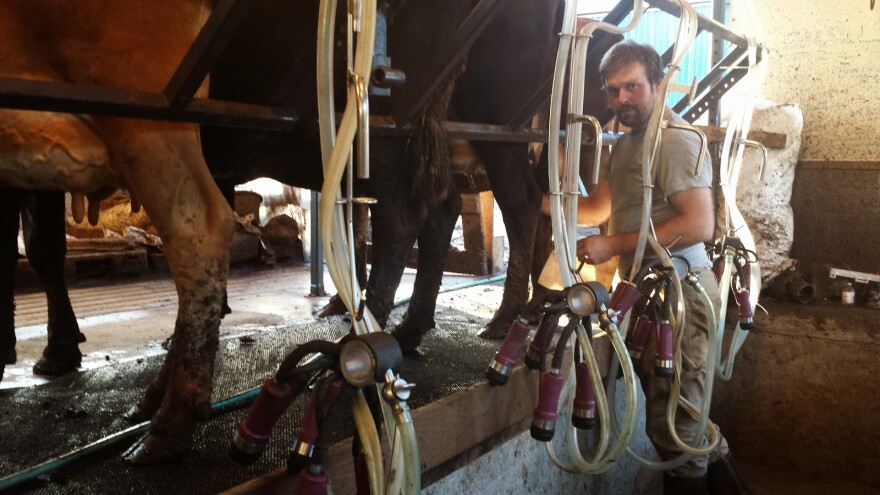The average age of the American farmer is continually rising; it's 55 in New York state. In response, many states are crafting legislation aimed at encouraging a new generation to take the reins, like Chris and Sarah Ficken, owners of the New Moon Farms in Munnsville, New York.
At their young ages -- Chris Ficken is 28 and Sarah Ficken is 27 -- they're somewhat of an anomaly in the agriculture industry. But, Chris Ficken doesn't see himself as an outlier. He was raised on a farm in Wisconsin and always wanted to start his own someday, which he said is not so simple for many in his generation.
"There are plenty of young people who would like to take on reins, but connecting those young people to older people who are willing to relinquish those reins, that's much more of a challenge than people realize," Chris Ficken said.

Chris Ficken moved to New York to attend Cornell University, where he met Sarah Ficken. Upon graduating, the two moved to Madison County to start their own farm. They say their small operation is getting off the ground after receiving a new-farmer grant last year worth $50,000. It was one of the 19 awards New York distributed with funding in its 2014-2015 budget to help encourage and support a younger generation of farmers. Another 25 received awards this year. Sarah Ficken said it helped them rebuild a barn that had been destroyed in a fire and resolved an important decision.
"It has very much closed the conversation as to if we are going to move to a different state and try farming there or a different area and try farming there," Sarah Ficken said. "By being able to build the infrastructure we need, we know we can make this farm work."
The state has invested more than $2.5 million into the new farmers initiative since it began two years ago. New York state Sen. Patty Ritchie (R-Oswegatchie) has been a leading advocate in Albany for the grants and other programs, like student loan debt assistance and farming apprenticeship programs for veterans. Ritchie said the funding can fix what could become a crisis.

"If we can’t encourage more people to go into farming, whether it’s young folks staying on the family farm or others who have not been exposed being interested in going into the agriculture industry, we’re going to be in serious trouble," Ritchie said.
A 2015 report from the New York state comptroller's office found that the agriculture industry contributed $37.6 billion to the state's economy in 2011. Comptroller Tom DiNapoli said 98 percent of those farms are family owned, like at Michael Wood's farm. He's a recent SUNY ESF graduate who is getting financial assistance with his student loan debt under the program.
"If it wasn't for me, I'm sure it would've been sold awhile ago," Wood said of his family farm.
Wood, like the Fickens, said the money he saves through the debt relief funding is invested right back into his family's operation.
"It’s definitely helped me put money back into the farm and not only into the farm, we sell locally and we have a strong following," Wood said. "It’s not just me I’m helping, it’s the community."
But for Ritchie, the biggest investment is in ensuring the agriculture industry continues beyond the baby boomer generation.
"If there’s no farms, there’s no food," Ritchie said.








